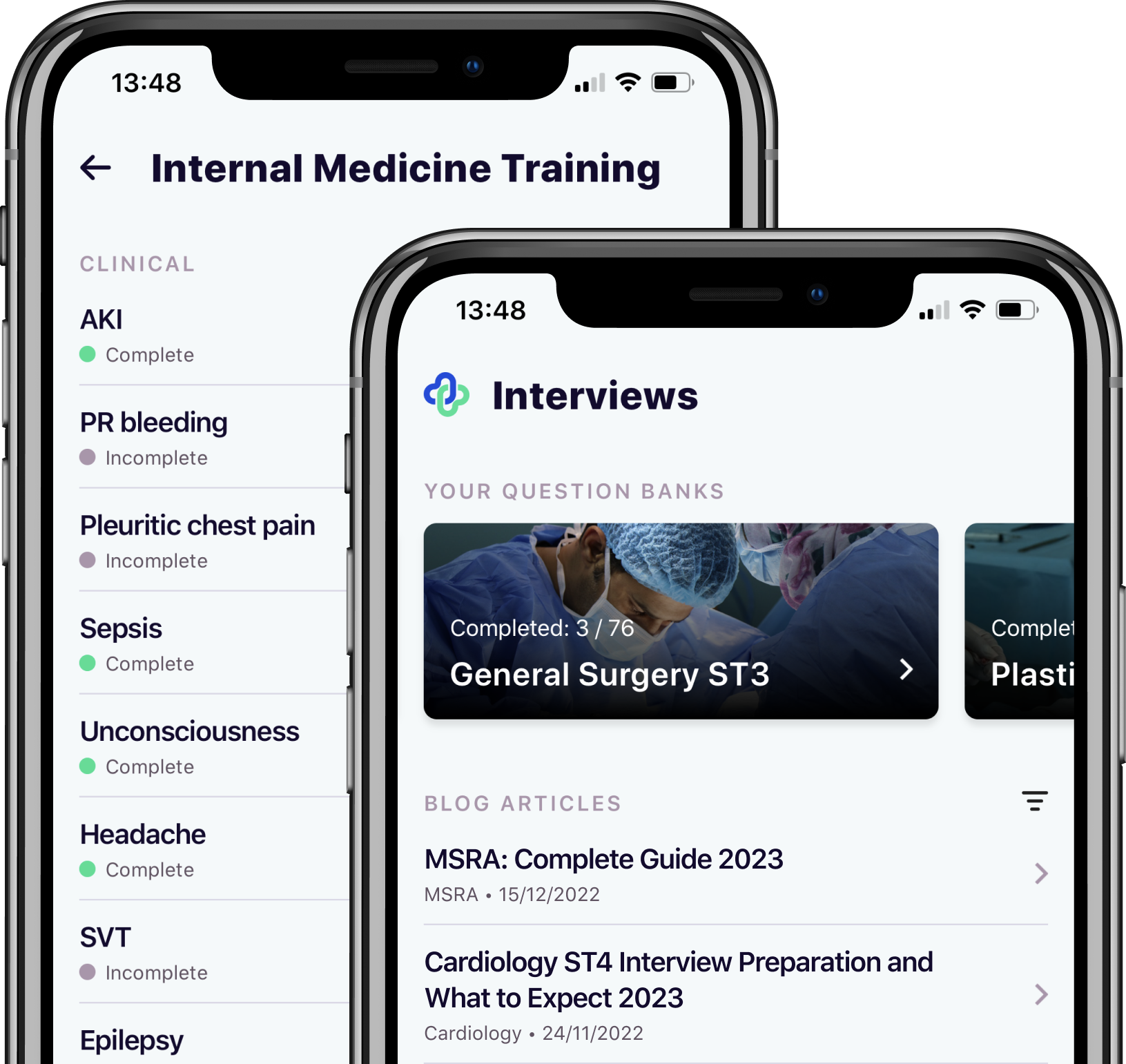
Emergency Medicine ST3 Interview Guide 2026
If you’re preparing for the Emergency Medicine ST3 interview, it’s essential to understand the application process, key recruitment dates, and what to expect on the day. With a competitive selection process, knowing how applications are assessed and how the interview is structured can help you prepare effectively.
Emergency Medicine ST3 Application
When applying for Emergency Medicine training, it’s crucial to determine which pathway best matches your experience and qualifications.
If you’ve completed the three-year ACCS Emergency Medicine program, then Emergency Medicine ST3 is the standard route. In 2025, there were just 11 applicants for 9 posts, making it one of the least competitive specialties.
If you haven’t done the full ACCS program but have relevant experience, you might be eligible for Emergency Medicine (DRE-EM) ST3 instead. This route includes an extra year to make sure you meet all the core training requirements. In 2025, there were 283 applicants for 25 posts, giving it a competition ratio of 11.32.
If you’re on, or have completed, an approved UK Core Surgical Training programme (CCT route) or an equivalent programme (CESR CP route), there are a few key requirements you need to meet before applying for Emergency Medicine ST3. Most importantly, you must have completed MRCS Part A and MRCS Part B by the time offers are made. If you’re applying via the CESR CP route, having FRCS or MFAEM will also be accepted.
Both Emergency Medicine ST3 and DRE-EM ST3 share the same person specification, so it’s worth checking the criteria carefully to see which one suits you best. If you don’t qualify for one, you might still be eligible for the other.
Emergency Medicine ST3 Self-Assessment
As part of your Emergency Medicine ST3 application, you’ll need to complete a self-assessment, which forms a key part of the selection process. This is your chance to score yourself based on your portfolio. There are 12 domains covering areas like your previous experience in ACCS training posts, postgraduate exams, teaching, and quality improvement work.
Each domain is scored from 0 to 3, meaning the maximum possible score is 36 points. The self-assessment stage is an important part of the process, so score yourself accurately and back it up with solid evidence. Overestimating your achievements won’t get you anywhere, and under-scoring yourself could put you at a disadvantage. Remember, after submission, the assessors will analyse your evidence and verify your scores. So, take your time, be thorough, and double-check everything before submitting!
Boost your Emergency Medicine ST3 Application by Training in Teaching
You can score up to 3 points by being involved in teaching. To score maximum points in this domain, you must have a master’s degree in medical education. However, you can also score an additional Emergency Medicine ST3 Application point by ‘training in teaching’. All you have to do is attend a course like the Medibuddy Teach the Teacher course. If you prefer learning in an interactive environment, where you can engage with peers and tutors, we also offer the course in 1-day and 2-day live formats.
| Option | Score |
|---|---|
| Master’s degree in medical education | 3 |
| Postgraduate diploma in medical education | 2 |
| Postgraduate certificate in medical education | 1 |
| University-accredited educational supervision course | 1 |
| ‘Train the Trainers’ education supervision course | 1 |
| No formal teaching qualifications | 0 |
This two-day CPD-accredited online course will earn you 12 CPD points on completion. It’s entirely flexible, so you can complete it in two days or multiple sessions over a longer period. On completion of the course, you’ll receive a certificate for your portfolio that is accredited for CCT, interviews and appraisals.
Teach the Teacher Course by Medibuddy
Emergency Medicine ST3 Recruitment Timeline
The 2026 recruitment dates for Emergency Medicine ST3 are below:
| Stage | Date |
|---|---|
| Applications open | 20 November 2025 at 10am |
| Application deadline | 11 December 2025 at 4pm |
| Self-Assessment Validation | 12 — 19 December 2025 |
| Interviews | 4 — 5 March 2026 |
| Initial offers released on | 14 April 2026 by 5pm |
| Holding deadline | 22 April 2026 at 1pm |
| Upgrade Deadline | 23 April 2026 at 1pm |
Emergency Medicine ST3 Interview Format
The Emergency Medicine ST3 Interview is a 30-minute multi-station panel interview designed to evaluate not only your clinical knowledge but also your decision-making, communication skills, and professionalism—all essential attributes for a future Emergency Medicine registrar. The interview is split into three 10-minute stations.
Clinical/Ethical Scenario Station
In this station, you can expect to be presented with a scenario that tests your ability to manage clinical and ethical challenges. These scenarios often reflect real-life situations you could face in the emergency department, such as dealing with a deteriorating patient, managing risk, or navigating dilemmas involving patient confidentiality or consent.
Below is an example of a clinical & ethical scenario that you can expect to find in our Emergency Medicine ST3 Question Bank:

Prioritisation Station
Emergency Medicine demands quick thinking and the ability to triage effectively. This station will assess your ability to prioritise tasks in a high-pressure scenario, such as deciding the order of patient care, allocating limited resources, or managing multiple simultaneous emergencies.
Communication Station
This station tests your ability to communicate effectively, whether with patients, their families, or colleagues. The scenario might involve breaking bad news, explaining a diagnosis, handling a difficult conversation with a patient, or resolving a conflict with a colleague.
How is the Emergency Medicine ST3 Interview Scored?
Your Emergency Medicine ST3 interview performance will be evaluated using a structured scoring system. Each station will be scored individually, and the combined scores will produce your overall interview score.
Your overall score and performance in each station will determine your final ranking. It’s worth noting that NHSE may set a minimum required score for individual domains, so it’s crucial to perform consistently across all stations. If you fail to meet the minimum score for any domain, your ranking will default to 0, and you will not progress further in the process.
Prepare thoroughly for each station to maximise your scores and ensure your best possible ranking.
Good luck!

Take your subscriptions with you
Our mobile app allows you to access your interview and exam question banks wherever you are.




